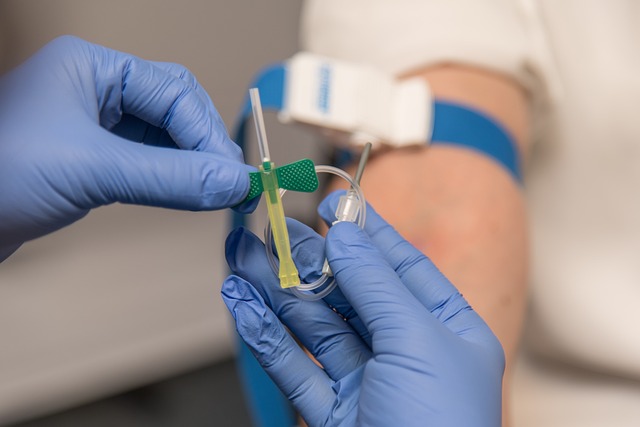Liver Function Tests (LFTs) are crucial for assessing liver health in the UK, detecting issues like damage, inflammation, and diseases. Home blood testing is a growing trend, offering a convenient and accessible way to monitor liver enzymes from the comfort of one's home, especially beneficial for those with limited mobility or living in remote areas. Interpreted results from these tests can indicate potential liver conditions, leading to timely interventions such as specialist care, lifestyle changes, or continued monitoring via subsequent UK blood tests at home.
“Unraveling the complexities of liver health through standard liver function tests (LFTs) is crucial for medical professionals. This comprehensive guide explores the intricate measurements these tests provide, emphasizing their significance in diagnosing and managing liver-related issues. We delve into the accessibility and benefits of UK home blood testing for liver enzymes, offering a convenient and confidential approach to monitoring liver health. Additionally, this article guides medical practitioners through interpreting LFT results, highlighting normal ranges, abnormalities, and essential next steps.”
Understanding Liver Function Tests: What They Measure and Why They Matter
Liver function tests (LFTs) are a crucial part of any comprehensive blood panel, offering medical professionals vital insights into liver health. These tests measure various enzymes and proteins produced by the liver, helping to identify potential issues or abnormalities. In the UK, where home blood testing is becoming increasingly popular, understanding LFTs is essential for both patients and healthcare providers.
Key markers include alanine aminotransferase (ALT), aspartate aminotransferase (AST), alkaline phosphatase (ALP), gamma-glutamyl transferase (GGT), and bilirubin. Elevations in these levels can indicate liver damage, inflammation, or conditions like fatty liver disease, hepatitis, or even cancer. Regular monitoring through home blood tests allows for early detection, enabling timely intervention and management, especially when coupled with other clinical assessments.
UK Home Blood Testing for Liver Enzymes: Accessibility and Benefits
In the UK, home blood testing for liver enzymes offers a convenient and accessible way for medical professionals to monitor patient health remotely. This non-invasive method allows individuals to conduct tests in the comfort of their homes, providing an alternative to traditional clinic or hospital visits. The accessibility of UK blood tests at home is particularly beneficial for those with limited mobility or living in remote areas, ensuring they can still receive essential healthcare services.
Home testing kits are easy to use and provide quick results, enabling early detection of potential liver issues. This proactive approach can lead to better patient outcomes as medical professionals can identify and manage conditions more effectively. Additionally, home blood tests offer privacy and convenience for patients, reducing the need for travel and waiting times associated with traditional healthcare settings.
Interpreting Results: Normal Range, Abnormalities, and Next Steps for Medical Professionals
Interpreting results from a standard liver function test (LFT) is crucial for medical professionals, especially when patients opt for a UK blood test at home. Normal ranges for LFTs vary slightly between laboratories but generally, a total bilirubin level below 17.1 μmol/L, alanine aminotransferase (ALT) and aspartate aminotransferase (AST) levels under 40 U/L, alkaline phosphatase (ALP) between 39 and 152 U/L, gamma-glutamyl transferase (GGT) from 8.7 to 64.4 U/L, and albumin at or above 33 g/L are considered within healthy parameters.
Abnormalities may indicate underlying liver conditions such as hepatitis, cirrhosis, or fatty liver disease. If results fall outside the normal range, medical professionals should discuss findings with the patient, consider risk factors, and order further tests if necessary. Next steps could include referring the patient for specialist care, recommending lifestyle changes, or monitoring the condition through subsequent UK blood tests at home to track any improvements or deteriorations.
In conclusion, standard liver function tests, coupled with accessible UK blood testing at home, empower medical professionals to proactively monitor and manage liver health. By understanding what these tests measure and interpreting results accurately, healthcare providers can identify abnormalities early on, allowing for timely interventions and improved patient outcomes. This innovative approach to liver health surveillance is a game-changer in today’s digital era, enabling folks to take charge of their well-being from the comfort of their homes.
